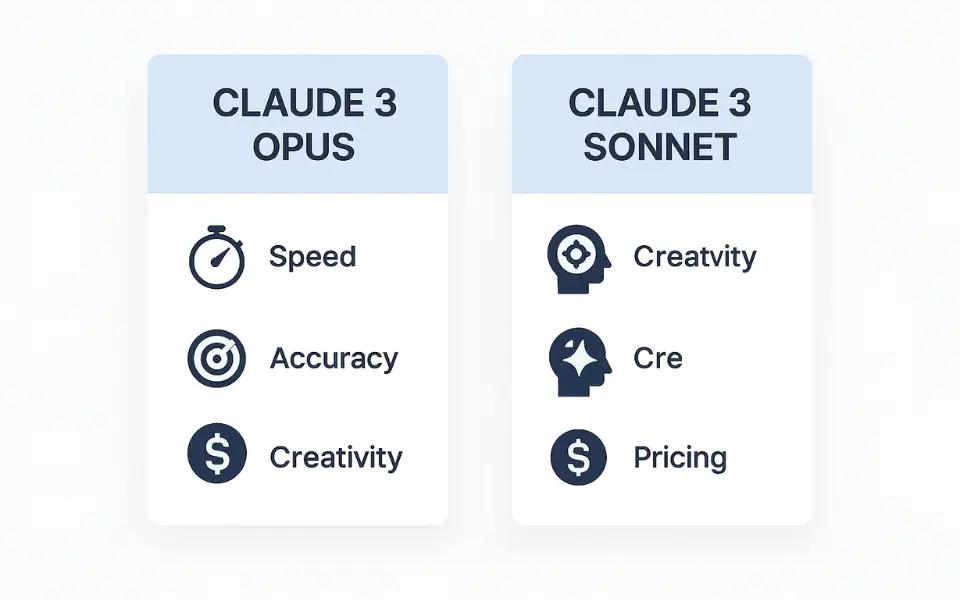Claude 3 Opus vs Claude 3 Sonnet: Which Model Is Right for You?
The Claude 3 family by Anthropic has quickly gained traction in the AI world, and two of its standout models are Claude 3 Opus and Claude 3 Sonnet. As we move deeper into 2025, individuals and businesses are trying to decide which model better suits their needs. Whether you’re a developer, content creator, or casual user, understanding the differences between Opus and Sonnet is essential.
This article provides a comprehensive, side-by-side comparison of Claude 3 Opus vs Claude 3 Sonnet, covering everything from performance and pricing to ideal use cases and limitations.
Overview: What Are Claude 3 Opus and Claude 3 Sonnet?

Claude 3 is Anthropic’s latest generation of AI models designed to deliver natural, safe, and high-performing conversational intelligence.
The Opus and Sonnet models represent two levels of capability and cost:
Claude 3 Opus is built for complex, high-performance tasks, while Claude 3 Sonnet offers a smart balance of speed and intelligence ideal for enterprise use and versatile applications.
- Claude 3 Opus: The most powerful, highest-performing model in the Claude 3 family.
- Claude 3 Sonnet: A mid-tier model that balances cost and performance.
Performance Comparison
| Feature | Claude 3 Opus | Claude 3 Sonnet |
|---|---|---|
| Model Strength | Highest performance | Mid-range performance |
| Context Window | 200K+ tokens | 200K+ tokens |
| Reasoning & Logic | Advanced (SOTA level) | Strong but slightly behind Opus |
| Language Understanding | Excellent | Very Good |
| Creativity | Superior for storytelling, ideation | Good for most creative tasks |
| Speed | Slower than Sonnet | Faster response time |
| Accuracy on Long Inputs | Exceptional | Good |
Verdict: If accuracy and deep reasoning are your top priorities, Opus is the better choice. If speed and cost matter more, Sonnet will meet most general-use needs.
Use Case Scenarios
✅ Best Use Cases for Claude 3 Opus
- Academic research and scientific content
- Complex legal or financial document generation
- Software architecture and deep code analysis
- Enterprise-level applications
- Large-scale data summarization
✅ Best Use Cases for Claude 3 Sonnet
- Blog posts, social media content
- Customer support chatbots
- Everyday business automation
- Educational tools and tutoring
- Lightweight coding assistance
Pricing & Access
| Plan/Model | Claude 3 Opus | Claude 3 Sonnet |
|---|---|---|
| Claude Pro Plan | Included ($20/month) | Included |
| Claude Max Plan | Included ($100–$200/month) | Included |
| API Access | Available (Premium rates) | Available (Cheaper rates) |
| Free Access | ❌ Not available | ✅ Included in free tier |
Note: Claude 3 Sonnet is accessible to free users via claude.ai, while Claude 3 Opus is exclusive to paid plans like Claude Pro and Max.
Intelligence and Reasoning
Claude 3 Opus excels at handling:
- Abstract reasoning
- Long-term dependencies
- Nuanced decision making
- Critical thinking
Sonnet performs well on everyday tasks but may oversimplify or miss nuance in extremely complex queries.
Benchmarks & Performance (Based on 2025 Data)
According to third-party evaluations:
- Claude 3 Opus consistently ranks at the top in MMLU, GSM8K, and ARC benchmarks
- Sonnet scores slightly lower but outperforms most open-source models in the same class
In blind user tests:
- 72% preferred Opus for longform responses
- 65% preferred Sonnet for fast answers with minimal latency
Availability & Platform Support
Both models are available on:
- Claude.ai (web interface)
- Anthropic API (for developers)
- Slack & integrations
- Third-party platforms (e.g., Notion, Latenode)
Safety & Alignment
Both Opus and Sonnet are trained using Anthropic’s Constitutional AI, meaning they follow ethical guidelines to reduce hallucinations and harmful outputs.
However:
- Opus shows slightly better self-correction and transparency
- Sonnet may require fine-tuning or monitoring for sensitive tasks
Claude 3 Opus vs Sonnet: Summary Table
| Category | Claude 3 Opus | Claude 3 Sonnet |
|---|---|---|
| Performance | 🟢 Best-in-class | 🟡 Very Good |
| Speed | 🟡 Slower | 🟢 Fast |
| Creativity | 🟢 Excellent | 🟡 Good |
| API Cost | 🔴 High | 🟢 Lower |
| Access for Free Users | 🔴 No | 🟢 Yes |
| Best For | Deep, complex work | Everyday productivity |
FAQs About Claude 3 Opus vs Sonnet
Conclusion: Which Claude Model Should You Choose?
- Choose Claude 3 Opus if you need unmatched intelligence, deeper reasoning, and work with high-stakes content like legal, academic, or engineering tasks.
- Choose Claude 3 Sonnet if you want great performance at a faster speed and lower cost — perfect for blogs, marketing, customer support, and daily AI use.
Both models are outstanding in their category. Your choice depends on your goals, budget, and how deeply you need the AI to think.







